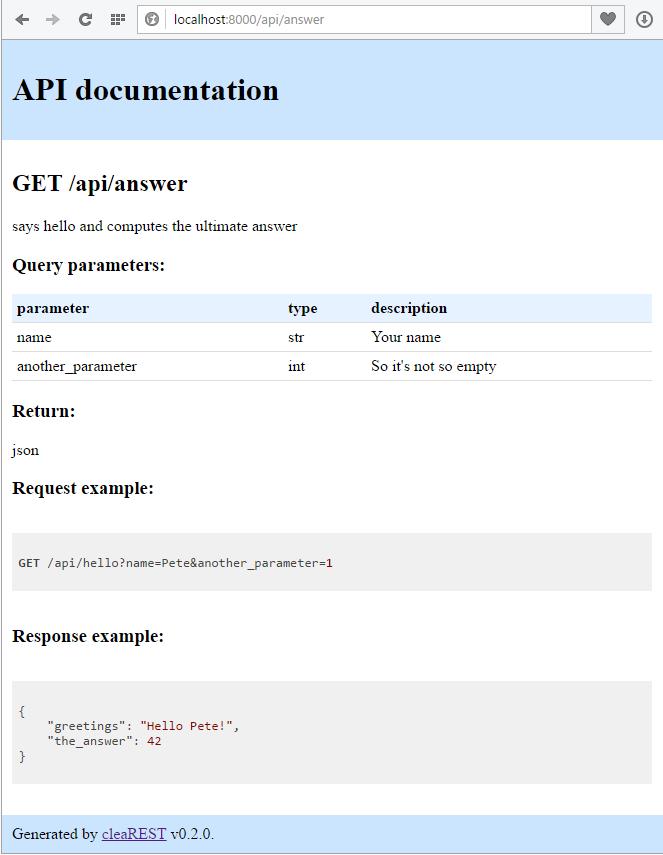Light-weight Python framework for building REST APIs.
Project description


cleaREST
Light-weight Python framework for building REST APIs
WSGI
minimalistic
easy to use
advanced variables processing
automatic html documentation generation
URL Routing
is done by decorating your handling function with one of these decorators:
@GET
@POST
only one argument is required (url to handle) ie:
@GET("/my/awesome/url")
def my_function():
...
optionally you can specify successful http result status (default is HTTP_OK) ie:
@GET("/my/awesome/url", status=HTTP_CREATED)
def my_function():
...
list of status tuples:
HTTP_OK
HTTP_CREATED
Variables
GET variables from query string
POST variables can be send as:
application/x-www-form-urlencoded
multipart/form-data
application/json
url path variables (identifier inside curly brackets) ie:
@GET("/my/awesome/url/{variable}") def my_function(variable): ...
Parsing
per parameter parsing function assigned as default value ie:
@GET("/my/awesome/url")
def my_function(myid=int):
...
optional parameter:
@GET("/my/awesome/url")
def my_function(myid=(int, 0)):
...
reduction multiple into one:
@GET("/my/awesome/url")
def my_function(user_id=lambda user, password: login):
...
Returning data
build-in support:
Class |
Content-type |
|---|---|
str |
text/plain |
dict |
application/json |
minidom |
application/xml |
etree |
application/xml |
you can also register any custom data-type or override table above with:
register_content_type(type_, content_type, handler)
Errors
to return a http error raise one of these exceptions:
HttpBadRequest
HttpNotFound
HttpUnsupportedMediaType
HttpNotImplemented
ie:
@GET("/my/awesome/url")
def my_function(myid=int):
if myid == -1:
raise HttpNotFound()
...
HTML Documentation
when is url opened by web-browser html documentation is shown instead of actual function call.
“application/xhtml+xml” in accept http header
similar tags to sphinx/docutils
extra example tags: “:example:” and for response “:rexample”:
ie:
@GET("/my/api")
def my_function(a, b=int):
"""
Describe your function here.
:param str a: Describe a here.
:param int b: Describe b here.
:return: W/E you function returns.
:example::
GET /my/api?a=someting&b=42
:rexample::
{
"something": "something"
...
}
"""
...
“real app” example:

Examples:
GET Hello world:
from wsgiref.simple_server import make_server
from clearest import application, GET
@GET("/")
def hello():
return "hello world!"
httpd = make_server("", 8000, application)
httpd.serve_forever()
Output:
curl localhost:8000
hello world!
POST var:
from wsgiref.simple_server import make_server
from clearest import application, POST
@POST("/")
def hello(what):
return "hello {what}!".format(what=what)
httpd = make_server("", 8000, application)
httpd.serve_forever()
Output:
curl –data “what=world” localhost:8000
hello world!










